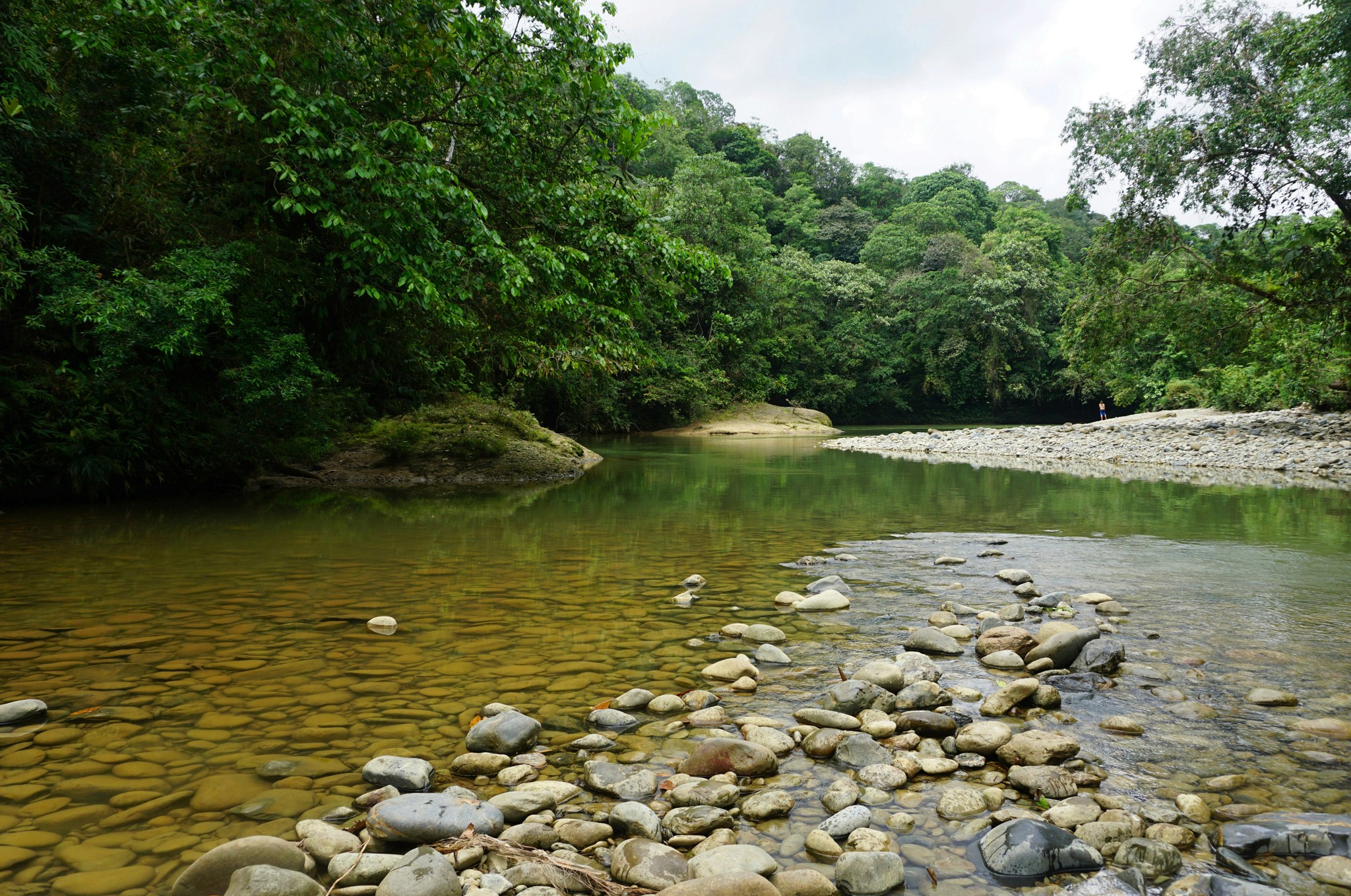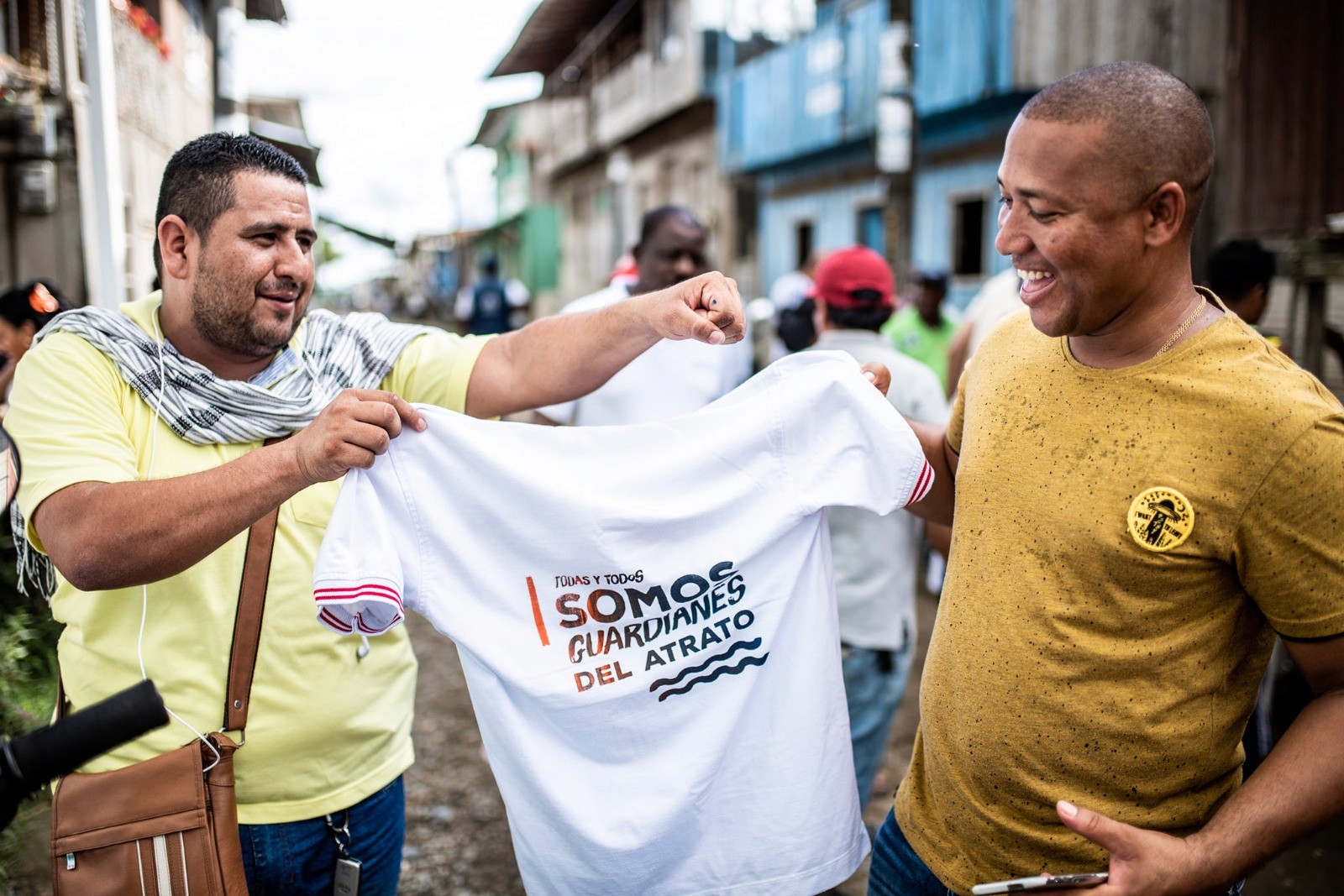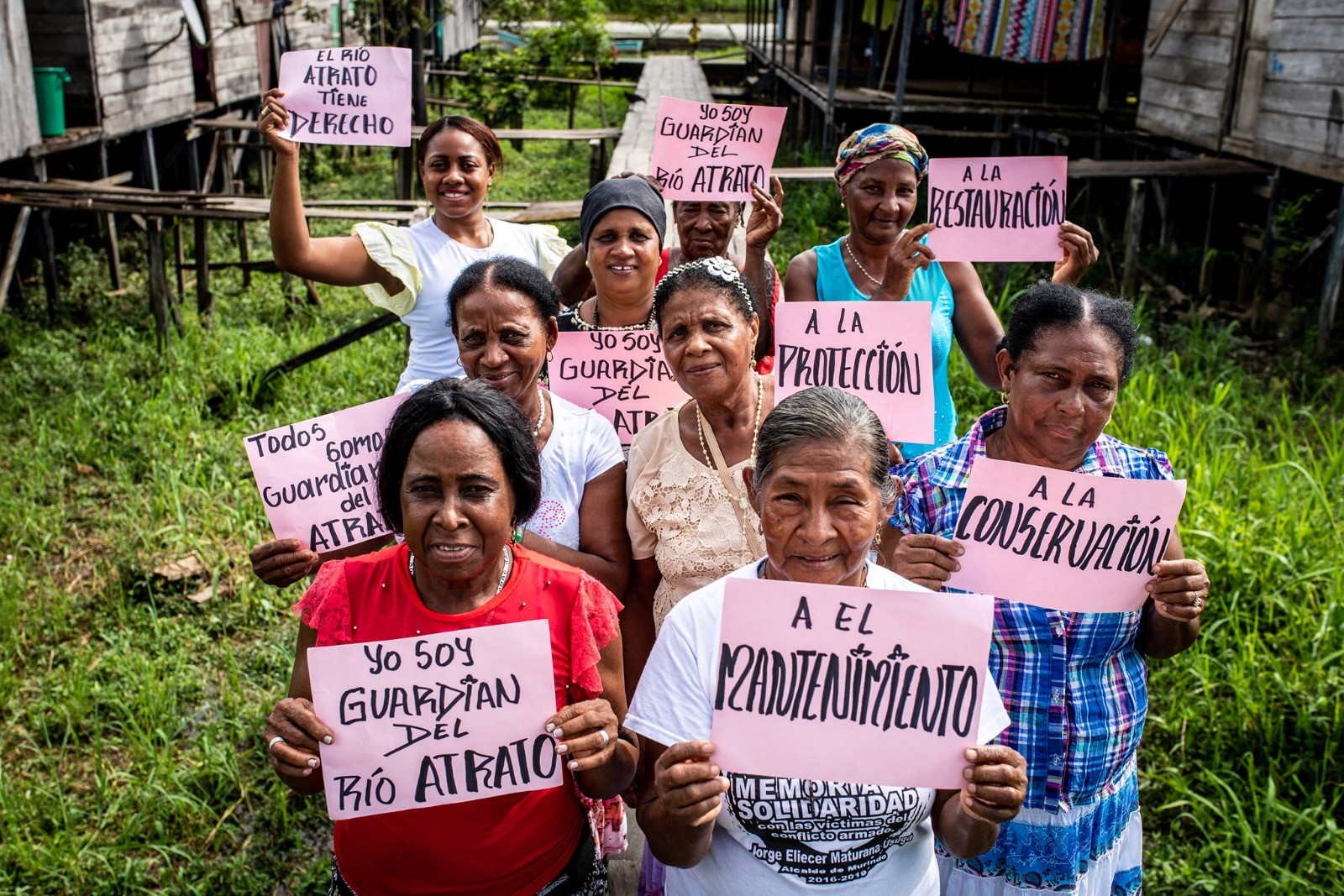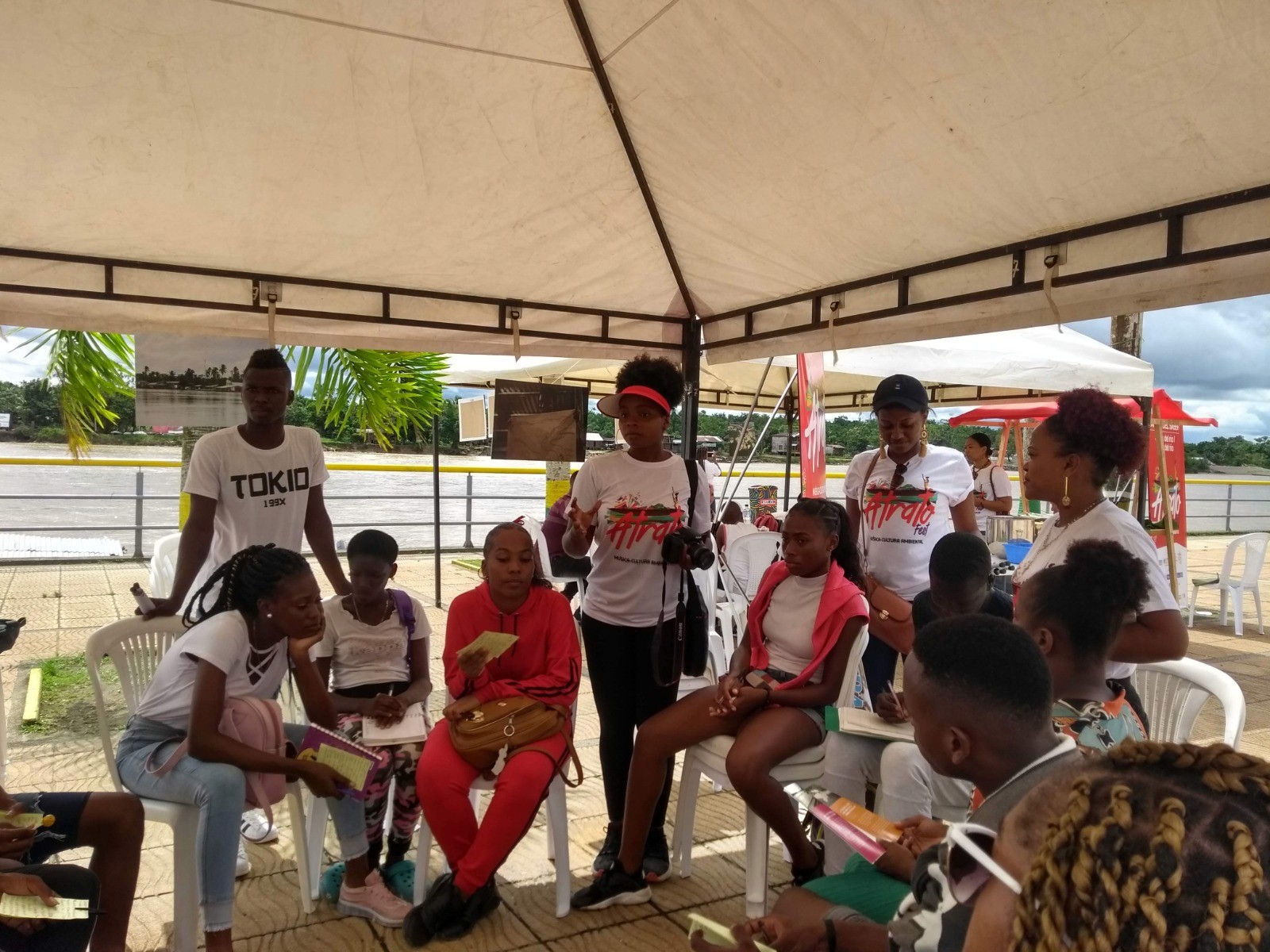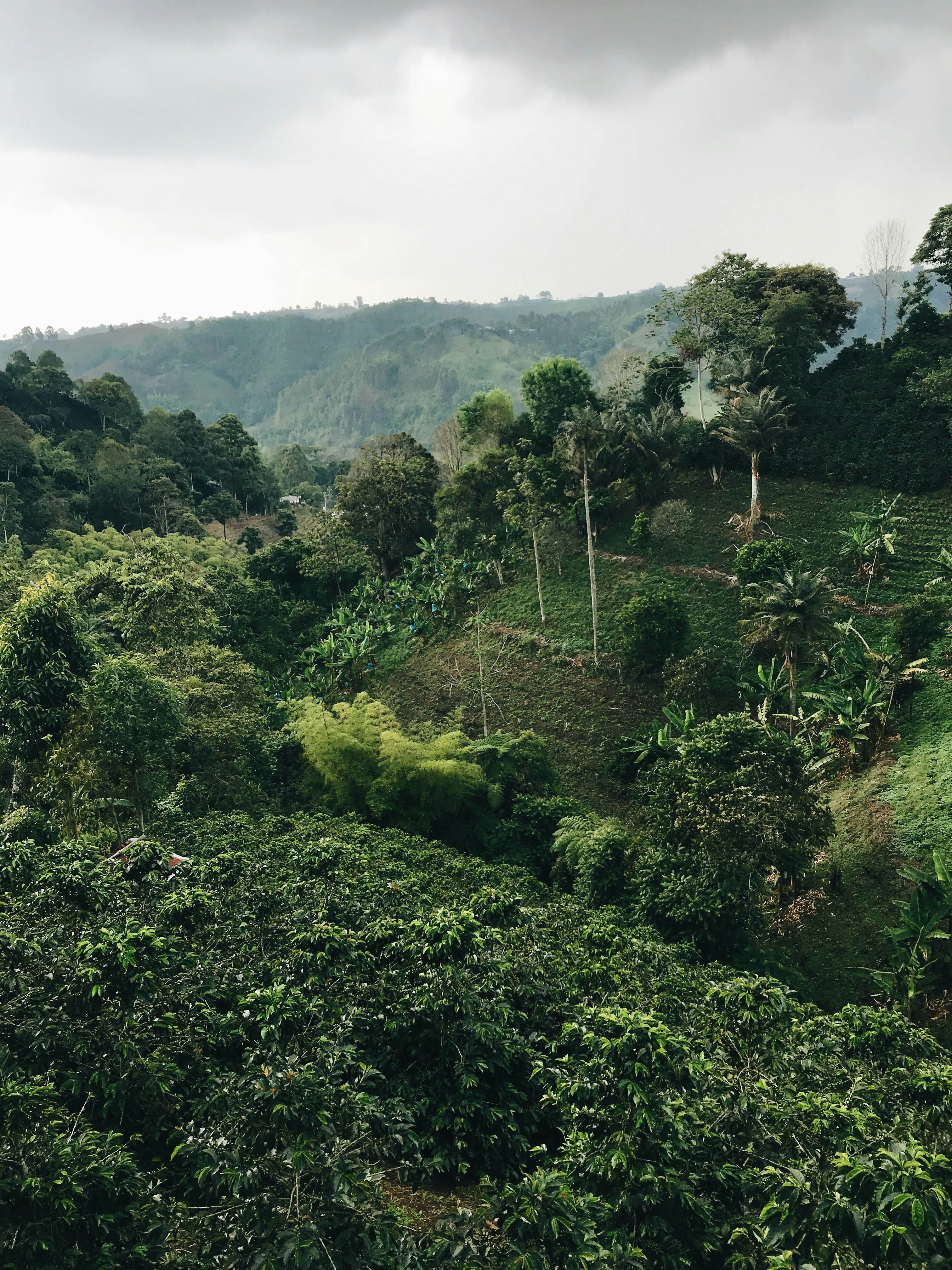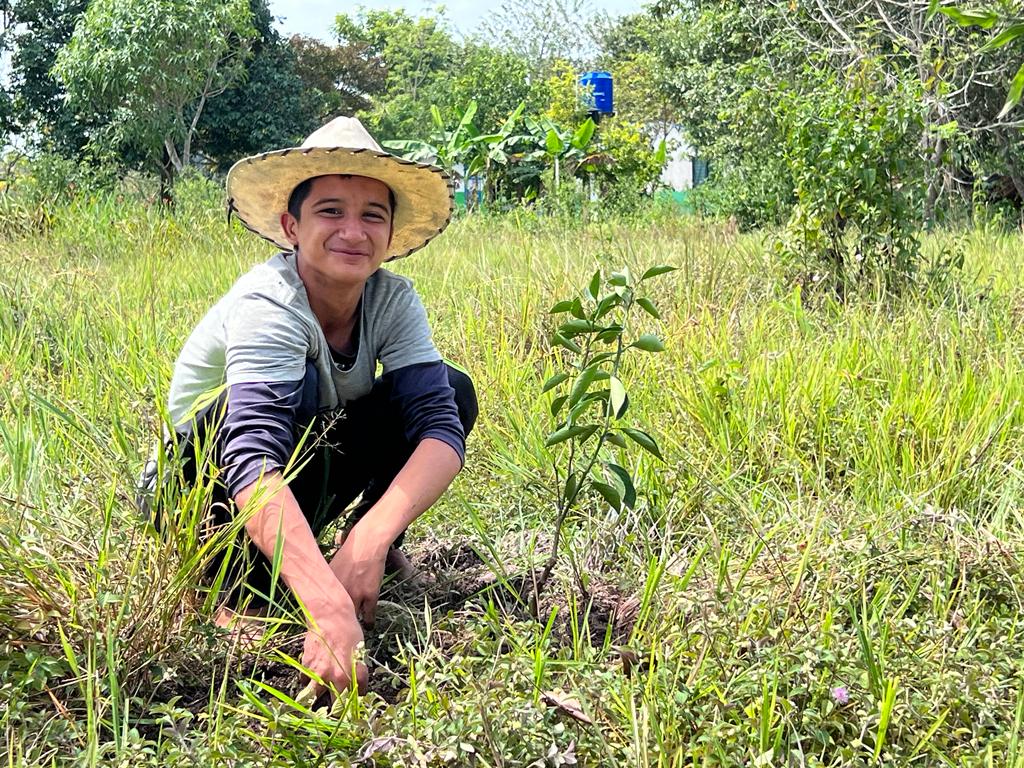Compilation of Climate Justice Advocacy
Good Practices of Local to Global Action
PROJECT DURATION
March to December 2019 (Phase 2); March 2022 to February 2025 (Phase 3)
BUDGET AND FUNDING
EUR 130,000 (Phase 2) / EUR 35,000 (Phase 3); Canton of Geneva (Switzerland), ACT Church of Sweden (Phase 2); ACT Church of Sweden, Finnish Evangelical Lutheran Mission and Evangelical Lutheran Church in America (Phase 3)
SNAPSHOT
The project was highly relevant as it contributed to achieving the full recognition of the rights of ethnic-territorial organizations that have been affected by the socio-environmental impacts of extractive activities in the region, as well as historical exclusion and marginalization. Additionally, the project has addressed violence perpetrated by illegal armed actors in the area. For the first time in Colombia, and for the third time in the world, a river was recognized as a legal personhood. The project indirectly benefited more than 400,000 inhabitants of the Atrato basin, belonging mainly to black communities and indigenous peoples who, through ruling T-622, found legal, technical, and public policy tools to strengthen their initiatives in food sovereignty and guarentee their rights. The initiative is designed to address adaptation, mitigation, and climate justice advocacy.
IMPLEMENTATION
The Lutheran World Federation Colombia and Venezuela World Service Country Program and Centro Socio Jurídico para la Sefensa Territorial Siembra (Phase 2 and 3)
Through its efforts, the project has brought national and international attention to these issues and worked toward ensuring that affected communities gain the recognition and support they deserve.
This project represents a seamless extension of previous collaborative initiatives within the region.
The initial phase received funding from the European Union between 2015 and 2018. Following that, the subsequent phase was financed by the Canton of Geneva from 2019 to 2020, and the final phase is currently being funded by Fondo Canasta, with a three-year project from 2022 to 2025.
As a result, the collective impact is the culmination of several years of dedicated efforts within the region.
One of the initial outcomes of the efforts invested in the region was the landmark ruling T-622 of 2016. This ruling had a significant impact as it mandated the preservation of the region’s biocultural wealth and granted the Atrato river legal personhood.
Furthermore, the communities have made substantial progress in the implementation of the action plans aimed at ensuring compliance with the court ruling.
The ethnic communities residing in the Atrato river basin actively participated in advocacy and training processes to secure the improvement of food sovereignty and self-sustainability within their territories.
They accomplished this by developing economic initiatives through careful planning.
Context
Extractive economies have a disproportionate impact on nature and the rights of the communities where they are implemented. In Colombia, the fact that these economies are promoted as the foundation of the development model is one of the country’s most challenging problems, together with their link to armed conflicts in vast regions.
It is necessary to propose alternative approaches to address this problem. This model of dispossession has historically led to injustice, rights violations, deepened inequality, and triggered numerous socio-environmental conflicts.
These conflicts revolve around the access to and control of common goods, pitting actors who have opposing interests and values against each other, all within a context of power imbalance.
The deployment of extractive policies and projects, both legal and illegal, with involvement from national and transnational capital, poses a significant threat to the free and autonomous pursuit of territorial initiatives that ethnic communities have built over the years.
This project arises to protect the Atrato river, which is the main river in the department and has been directly affected by illegal mining and is currently contaminated by mercury.
“Chocó is a region with a large presence of ethnic population (indigenous and Afro descendants) mired in inequality and poverty, that has been affected by the armed conflict and by illegal economies (armed groups). Natural resources are illegally exploited by armed groups and international companies, thus diminishing the right to a healthy environment, clean water, and affecting the food sovereignty and cultural traditions of the groups in the region.” (Steffany Marimon Vidal, Project Professional PME, LWF World Service Colombia Program)
The first phase of the project gave rise to ruling T-622 of 2016, which gave the river legal personhood and ordered the protection of the rights of ethnic communities to life, water, a healthy environment, culture, and territory.
However, the degree of compliance of those responsible has been weak and the Ministry of Agriculture has not given it the necessary priority.
"In 2018, the group of guardians of the Atrato was formed. These groups engage in advocacy and participatory activities that ensure sustainability through planning and economic initiatives." (Steffany Marimon Vidal, Project Professional PME, LWF World Service Colombia Program)
For this reason, SIEMBRA (formerly Tierra Digna) provides support for the defense of the rights and territory of several communities in the country that are affected by socio-environmental impacts. They do so through three strategies: environmental justice, extraction and corporate power, and smallholder and ethnic-territorial rights.
This is the case of the communities in the Atrato river basin, who undertook a guardianship action to protect the Atrato river, which was resolved by the constitutional court through ruling T-622 of 2016.
In this ruling, the court ordered to safeguard the region’s biocultural wealth and declared the Atrato river a legal personhood. Similarly, it ordered the formulation of three action plans aimed at: reforesting and ecologically restoring the basin; recovering food sovereignty, lifestyles, and the cultural values of the riverside communities; and neutralizing illegal mining.
In addition, the court ordered the appointment of two guardians of the river, one state and one community. The Ministry of the Environment was designated as the guardian for the state and the communities formed the Collegiate Body of Guardians of the Atrato (CCGA), an articulation of seven representative organizations from the entire basin, who have assigned fourteen community leaders.
Criminalization of the use of mercury
The above-mentioned ruling T-622 of 2016 and bill 059-20 are two legal instruments of relevance. The latter aims to strengthen the punitive repression of the illegal exploitation of minerals, criminalizing behaviors related to the use of mercury and the commercialization, exploitation, and transport of minerals of illegal origin.
This bill is a significant step toward strengthening controls because, without these measures, the actors, individuals, and officials involved in the criminal chain can continue to benefit from the high impunity of the penal system that prevails today.
These initiatives focus on strengthening legal instruments to provide the communities and the state with penal, administrative, and sanctioning tools to fight crime, counteract the illegal exploitation of minerals in ecosystems, reduce environmental damage, reduce social and economic impacts, and other activities related to exploration, exploitation, transportation, and marketing.
Advocacy activities
An online advocacy event, A River with Rights: The Case of the Atrato in Colombia, was held with around 90 participants and included participation from several partners, such as the LWF, Fian, Alianza, and Clima.
Additionally, participants joined from other non-government organizations, such as World Wildlife Fund (WWF), Earthjustice, Greenpeace, Caritas, and from various universities. Most of the participants were from European countries (Switzerland, Germany, Austria, France, Finland, Sweden, and so on), North America, and Colombia, and there were also some participants from Central America, Peru, and Africa.
As part of its advocacy strategies, the project had wide local, national, and international coverage in different news and social media platforms such as El Espectador, Puntos, Unidad para las Victimas, France24, Centro Socio Jurídico para la Defensa Territorial, elDiario.es, among others. Additionally, it has its own online platform, where news and updates are shared.
The advocacy strategies were affected by COVID-19. Therefore, to adapt the plan to the new context, the official website of the guardians of the Atrato was created.
This features a presentation of what the Collegiate Body of Guardians of the Atrato is, how the ruling arose, what its orders are, what progress has been made, what actions the body has developed, and what investigations have been carried out under the ruling.
In 2020, the project was presented in El Espectador, with wide coverage in Colombia. Here, the context and existing implementation of sentence T-622 was explained. Additionally, Leyner Palacios, the Pacific Truth Commission Secretary publicly stated:
“We want to know the truth about the real interests behind these large agro-industrial and development projects and how the armed conflict is used to deprive the population of the territory and then carry out these massive projects.” (Source: El Espectador)
In 2022 there was an event at the University of Glasgow organized in conjunction with ABColombia, a coalition of 100-plus partner organizations operating in South American countries, including several Catholic Caritas-affiliated agencies: the Scottish Catholic International Aid Fund (SCIAF), the Catholic Agency for Overseas Development (CAFOD), representing the bishops of England and Wales, and Trócaire from Ireland, which was covered by EarthBeat.
Moreover, the project participated in the Award for the Best Leaders of Colombia 2019 organized by Semana Magazine. The Guardians were among the twenty finalists nationwide, among more than 400 applicants.
Finally, the Collegiate Body of Guardians, in coordination with the cultural house MOTETE and Tierra Digna, created the Atrato Fest festival, dedicated to highlighting the culture around the Atrato River, the identity of its inhabitants, and the protection of the basin. The Atrato Fest has been part of the approach to make the T-622 ruling part of the daily life of citizens.
The first edition of the festival was held from August to September 2019 and was celebrated in Quibdó and six other municipalities: Medio Atrato, Vigía del Fuerte, Río Quito, El Carmen de Atrato, Carmen del Darién, and Atrato.
Finally, the festivities of the patron saint of Quibdó, known as the "San Pacho" carnival, have been declared Intangible Heritage of Humanity. Since 2019, these celebrations have served as a tribute to the Atrato river, symbolizing the community's deep reverence for their natural environment. The Collegiate Body of Guardians, together with the Fiestas Franciscanas Foundation, led an agenda to raise awareness and disseminate knowledge of the T-622 ruling within the framework of the festivities.
Between September and October, the Guardians participated in the traditional masses, workshops were held in the city’s schools, and a campaign, A deal with the Atrato, was developed. The Atrato river was the protagonist of the festivities, and its inhabitants recognized the transcendental role it has in forging Chocoana culture.
Community education, sensitization, and capacity-building
The communities received training and education about the implementation of ruling T-622 and its meaning and importance for the river’s rights recognition. For this reason, and to share the progress achieved in its implementation, an explanatory textbook was prepared and used during the community training.
The Guardians were sensitized on food sovereignty, diversity, sustainability, and how the development of mining has deteriorated their sources of food, health, and livelihoods.
Several training sessions focused on strengthening the community to manage their enterprises were carried out:
1. A session on the care and handling of chickens was held in San Isidro for the beneficiaries of chicken breeding, with 22 participants.
2. Basic accounting sessions were conducted with four vulnerable groups in Quibdó, Riosucio, with 38 participants.
3. A workshop on evironmental protection took place in Riosucio, with 14 participants.
4. Nine embroidery and sewing workshops were held for young people from the “Raíces y alas” and “Choibá” handicrafts group in Quibdó, with 18 participants per workshop.
5. Workshops focusing on knowledge exchange in traditional medicine were conducted in Riosucio, with 40 women participants.
Local to Global to Local
At the local level, the focal point was in the community strengthening of the Collegiate Body of Guardians and Guardians of Atrato and its member organizations. Moreover, staff of the municipalities also participated. At the national level, there were different incidence activities with the ministries, such as the Ministry of Defense, the Ministry of Foreign Affairs, and the Ministry of Agriculture; the National Police Unit against illegal mining, the National Army, Governors, and other competent authorities of the state to ensure full and effective implementation of the ruling. At the international level, there were several advocacy activities (see above) with efficient and wide exposure, resulting in the local community being strengthened thanks to international pressure.
1.
For the first time in Colombia, and for the third time in the world, a river was recognized as a legal person, meaning that the river is considered a living entity that sustains other forms of life and cultures and that it is not an object of appropriation, but a subject of protection.
2.
The support for these first seven productive initiatives has given a boost to 127 families (508 people directly), to recover their livelihoods.
4.
The project has been a great success due to its incidence in implementing the delayed orders of ruling T-622, as well as strengthening the organizational process of the Collegiate Body of Guardians of Atrato.
3.
The project implemented the yearly tradition of celebrating the Atrato Fest and San Pacho, with the river as the protagonist of both celebrations, which creates a sense of identity and belonging and celebrates the transcendental role of the river in Chocoana culture.




